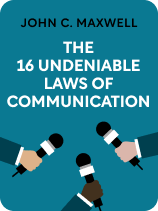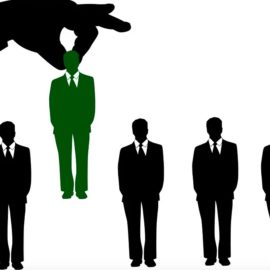

This article is an excerpt from the Shortform book guide to "The 16 Undeniable Laws of Communication" by John C. Maxwell. Shortform has the world's best summaries and analyses of books you should be reading.
Like this article? Sign up for a free trial here.
What’s the primary goal of public speaking? How’s it achieved?
In The 16 Undeniable Laws of Communication, internationally renowned speaker John C. Maxwell shares his secrets to becoming a confident and effective communicator capable of delivering any message to any audience. He provides practical tips for achieving the primary objective of public speaking.
Read more to learn how to motivate people with Maxwell’s three recommendations.
How to Motivate People
Maxwell writes that the ultimate goal of a speaker is for your audience to take action after hearing your message. Speaking to people doesn’t directly change their lives—your words must drive them to make a change. Maxwell provides several recommendations on how to motivate people to take action.
(Shortform note: While Maxwell argues that persuading people to take action is the ultimate goal of public speaking, other experts discuss some other goals you might have when talking in front of an audience. You might be delivering an explanatory speech, where your goal is to simply teach or explain something to your audience. In that case, you should focus on clarity and on translating difficult concepts into layman’s terms. You might also be delivering an imaginative speech, where your goal is to delight people, for instance, with an art project or an invention. Instead of getting people to act, you may be more motivated to create an enjoyable experience for your audience.)
#1: Tell Personal Stories
Encourage people to take action by sharing stories about how you acted upon your advice. Your personal stories can act as proof of how your message works in real life. For example, if you tell your audience to meditate for an hour every day and explain how you came up with your lucrative business idea during one of your meditative sessions, people will be more motivated to heed your advice.
(Shortform note: Researchers analyzed what made TED Talks popular and found that personal stories made up 65% of the content of the most viral presentations. Their research also supports Maxwell’s argument that personal stories spark action: In his TED Talk about the injustices of the criminal justice system, Bryan Stevenson incorporated stories about the lessons he’d learned from his grandmother, activist Rosa Parks. His TED Talk motivated the audience to donate $1 million to his non-profit organization.)
#2: Help Them Visualize the Positive Change
Paint a picture of what their lives will look like if they act on your message. This gives your audience a glimpse of how they might feel if they take your advice and motivate them to take action.
(Shortform note: Some experts argue that visualization is more effective when people visualize the steps needed to reach their goal rather than visualizing themselves achieving the goal itself. People who picture themselves accomplishing their goals often become less motivated to take action because their brains believe that they’ve already succeeded. Instead of painting a picture of an end result, then, it might be better to help your audience visualize the steps toward that end result.)
#3: Show Them the First Step
Maxwell suggests you make it clear how audience members can take the first step, whether it’s practicing better financial habits or improving their relationships. If you only provide the end result, people can feel overwhelmed and unsure of how to reach it. Encouraging people to take the first step is important, Maxwell argues, because action breeds confidence, which empowers people to take further action to improve themselves and their lives.
(Shortform note: In Eat That Frog!, Brian Tracy explains why it helps your audience to show them the first step toward a larger goal: Humans have a need for closure. When you complete something, your brain releases chemicals that make you feel good. If you present your audience with a daunting end goal that takes time (like becoming a masterful communicator, for instance), they may gradually feel discouraged by a lack of achievement. Instead, by breaking the journey up with milestones—for example, having your first meetup with your team to discuss your message—you give people more opportunities to feel a sense of progress.)

———End of Preview———
Like what you just read? Read the rest of the world's best book summary and analysis of John C. Maxwell's "The 16 Undeniable Laws of Communication" at Shortform.
Here's what you'll find in our full The 16 Undeniable Laws of Communication summary:
- The secrets to becoming a confident and effective communicator
- How anyone can master public speaking, no matter how nervous they get
- How to write a clear and engaging speech






